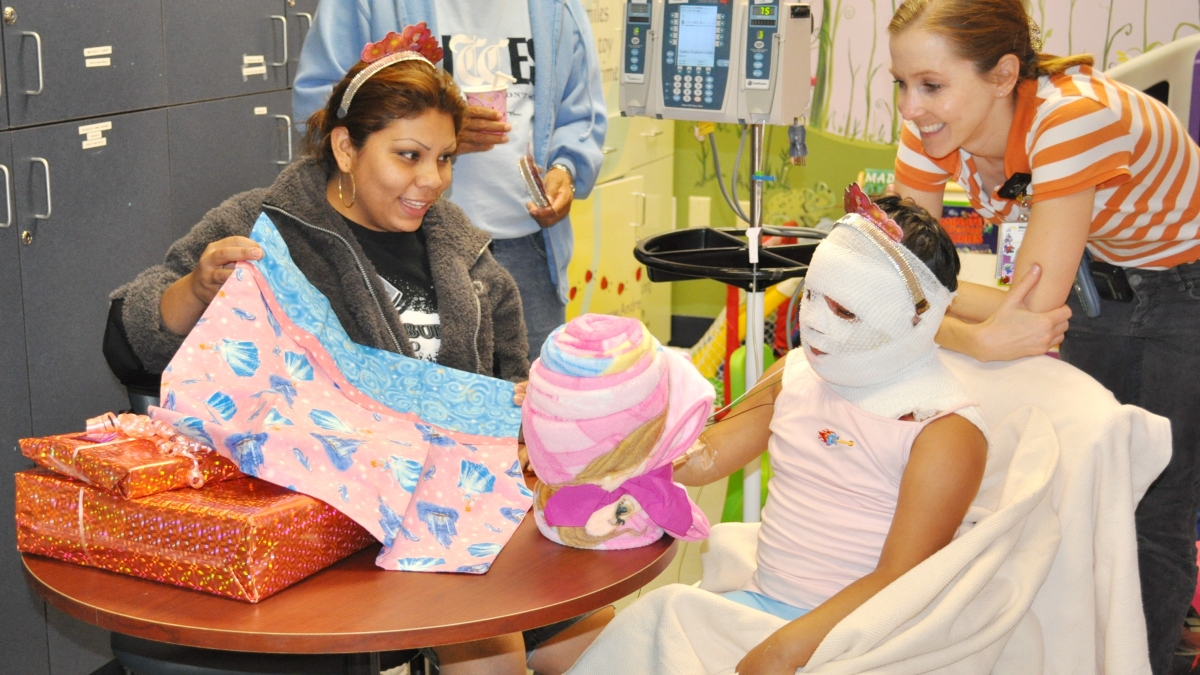Child life program trains students to ease children's fears in hospitals

Child life specialists help children cope with health challenges through play and easily understood explanations. Through age-appropriate activities, the specialists ease anxiety and fear.
“Children can be very frightened of medical procedures," said Tracy Spinrad, associate professor in the T. Denny Sanford School of Social and Family Dynamics at ASU. "Child life specialists are experts in child development who explain the procedure to the child according to their developmental stage. They’ll use materials like puppets to explain to children about what to expect during medical procedures or why they have to take yucky medicine.”
ASU students enrolled in the Child Life Specialist program at the university will present evidence-based poster sessions at the upcoming Seventh Annual Phoenix Area Child Life Conference, “Treating the Whole Child: Emphasis on Culture, Family, & Integrating Therapies.”
Laura Blazev, an ASU junior in the Child Life Development program who is majoring in family and human development, is presenting a poster on Bringing Child Life to the NICU. “Child life is a very new field and a new profession. There are places where it hasn’t been placed,” she said.
Blazev believes that child life specialists can do a world of good in the neo-natal intensive care unit.
“Their family environment is going to be really stressful on the family and siblings. Child life has the ability to come in and make all of those aspects less stressful, daunting and terrifying,” she said.
The child life certificate offered by the School of Social and Family Dynamics in the College of Liberal Arts and Sciences and the School of Community Resources and Development in the College of Public Programs at ASU is designed to prepare students for the national qualifying child life exam and a career as a specialist. The Child Life Certificate program at ASU was developed as a partnership between programs that teach the varied stages of child development and methods of therapeutic play to address the concerns of children and families during hospitalizations, hospice or other medical challenges.
ASU students in the program shadow child life specialists for a semester in hospital settings, providing invaluable experience and networking connections in the profession. In order to earn their certificate to practice as a specialist, they must complete an internship as well as the qualifying exam.
“They are going to be the ones who are at the top of the list when it comes to getting an internship,” Spinrad said.
Fearful and anxious children are the ultimate beneficiaries when they are able to understand what is happening to them in a medical setting and why they have to undergo a painful procedure, said Kelly Ramella, recreation therapy instructor in the School of Community Resources & Development at ASU.
“Play is a big part of a child life specialist’s work. You don’t want to introduce anything unless they are developmentally ready to handle it,” Ramella said.
Referred to as one of the best kept secrets in careers by Money magazine in 2008, the field is still not widely known, but many area hospitals now employ child life specialists to help their youngest patients cope with medical challenges.
“Most of the students that we talk to for the certificate program found out about it through being patients," Ramella said. "They say that the thing that had the greatest impact on them was the interaction with the child life specialist.”
ASU senior Andrea Leon, who is majoring in family and human development, will present a poster titled, “Grieving Hispanic Families & the ATTEND Model, Coping with Grief through Family Empowerment,” at the conference.
Addressing needs of Hispanic children and families with health challenges through culturally sensitive means can be accomplished through the ATTEND model created by Dr. Joanne Cacciatore, Leon said. The model addresses attunement (the clinician’s ability to emotionally handle situations like a child’s death), trust of the child life specialist, therapeutic touch, egalitarianism (the balance of power between the specialist and parents), nuance (each family’s uniqueness and cultural differences) and death education that helps siblings cope.
“Talking about what happened with their brother and sister and that it isn’t their fault is important. And, just because it happened to a sibling doesn’t mean it’s going to happen to them,” Leon said.
The Seventh Annual Phoenix Area Child Life Conference, “Treating the Whole Child: Emphasis on Culture, Family, & Integrating Therapies,” is from 7:30 a.m. to 4:15 p.m., March 22, at Cardon Children’s Medical Center at Banner Desert Medical Center.